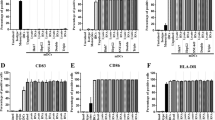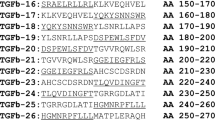Abstract
Tumor-associated antigen 90K is implicated in cell–cell and cell-extracellular matrix adhesion through its interaction with galectin-3 and integrin-β1 and is highly expressed in malignant tissues, making it a novel target for the development of new immunotherapies. We investigated a potential immunotherapy treatment for colon cancer using 90K-specific cytotoxic T lymphocytes induced by autologous dendritic cells and pulsed with 90K peptides. We selected three peptides (90K351, 90K5 and 90K523) that bind to HLA-A*0201 molecules on the basis of their binding affinity, as determined by a peptide-T2 binding assay. Dendritic cells pulsed with 90K peptides resulted in the efficient generation of mature dendritic cells and exhibited enhanced T-cell stimulation and polarization of naive T cells toward Th1. Dendritic cells pulsed with 90K peptides generated potent cytotoxic T-lymphocytes that lysed T2 cells loaded with each 90K peptide, and 90K+/HLA-A2+ colon cancer cell lines, including HCT116 and SW480, in a dose-dependent and HLA-A*0201-restricted manner. No killing was observed in 90K+/HLA-A2− DLD1 or 90K−/HLA-A2− K562 cells. Therefore, we believe that cytotoxic T-lymphocytes stimulated by 90K peptide-pulsed dendritic cells naturally recognize the 90K peptide presented by colon cancer cells in the context of HLA-A2, and kill 90K-positive tumor cells. Dendritic cells pulsed with 90K peptides led to the induction of granzyme B and perforin positive CD8+ T cells against HCT116 and SW480 cells, but not DLD1 cells. In conclusion, 90K-specific cytotoxic T lymphocytes, generated by stimulating T cells with 90K peptide-pulsed dendritic cells, could be useful effector cells for the immunotherapy treatment of colon cancer.
This is a preview of subscription content, access via your institution
Access options
Subscribe to this journal
Receive 12 digital issues and online access to articles
$119.00 per year
only $9.92 per issue
Buy this article
- Purchase on Springer Link
- Instant access to full article PDF
Prices may be subject to local taxes which are calculated during checkout




Similar content being viewed by others
References
Morse M, Langer L, Starodub A, Hobeika A, Clay T, Lyerly HK . Current immunotherapeutic strategies in colon cancer. Surg Oncol Clin N Am 2007; 16: 873–900.
Ogino S, Galon J, Fuchs CS, Dranoff G . Cancer immunology-analysis of host and tumor factors for personalized medicine. Nat Rev Clin Oncol 2011; 8: 711–719.
Liu F, Hu X, Zimmerman M, Waller JL, Wu P, Hayes-Jordan A et al. TNFα cooperates with IFN-γ to repress Bcl-xL expression to sensitize metastatic colon carcinoma cells to TRAIL-mediated apoptosis. PLoS One 2011; 6: e16241.
Novellino L, Castelli C, Parmiani G . A listing of human tumor antigens recognized by T cells. Cancer Immunol Immunother 2005; 54: 187–207.
Nagorsen D, Keilholz U, Rivoltini L, Schmittel A, Letsch A, Asemissen AM . Natural T-cell response against MHC class I epitopes of epithelial cell adhesion molecule, HER-2/neu, and carcinoembryonic antigen in patients with colorectal cancer. Cancer Res 2000; 60: 4850–4854.
Nagorsen D, Scheibenbogen C, Marincola FM, Letsch A, Keilholz U . Natural T cell immunity against cancer. Clin Cancer Res 2003; 9: 4296–4303.
Iacobelli S, Arnò E, D'Orazio A, Coletti G . Detection of antigens recognized by a novel monoclonal antibody in tissue and serum from patients with breast cancer. Cancer Res 1986; 46: 3005–3010.
Rosenberg I, Cherayil BJ, Isselbacher KJ, Pillai S . Mac-2-binding glycoproteins. Putative ligands for a cytosolic beta-galactosidelectin. J Biol Chem 1991; 266: 18731–18736.
Koths K, Taylor E, Halenbeck R, Casipit C, Wang A . Cloning and characterization of a human Mac-2-binding protein, a new member of the superfamily defined by the macrophage scavenger receptor cysteine-rich domain. J Biol Chem 1993; 268: 14245–14249.
Ullrich A, Sures I, D'Egidio M, Jallal B, Powell TJ, Herbst R et al. The secreted tumor-associated antigen 90K is a potent immune stimulator. J Biol Chem 1994; 269: 18401–18407.
Lee JH, Bae JA, Seo YW, Kho DH, Sun EG, Lee SE et al. Glycoprotein 90K, downregulated in advanced colorectal cancer tissues, interacts with CD9/CD82 and suppresses the Wnt/β-catenin signal via ISGylation of β-catenin. Gut 2010; 59: 907–917.
Sasaki T, Brakebusch C, Engel J, Timpl R . Mac-2 binding protein is a cell-adhesive protein of the extracellular matrix which self-assembles into ring-like structures and binds beta1 integrins, collagens and fibronectin. EMBO J 1998; 17: 1606–1613.
Tinari N, Kuwabara I, Huflejt ME, Shen PF, Iacobelli S, Liu FT . Glycoprotein 90K/MAC-2BP interacts with galectin-1 and mediates galectin-1-induced cell aggregation. Int J Cancer 2001; 91: 167–172.
Fusco O, Querzoli P, Nenci I, Natoli C, Brakebush C, Ullrich A et al. 90K (MAC-2 BP) gene expression in breast cancer and evidence for the production of 90K by peripheral-blood mononuclear cells. Int J Cancer 1998; 20; 79: 23–26.
Park YP, Choi SC, Kim JH, Song EY, Kim JW, Yoon DY et al. Upregulation of Mac-2 binding protein by hTERT in gastric cancer. Int J Cancer 2007; 120: 813–820.
Ozaki Y, Kontani K, Hanaoka J, Chano T, Teramoto K, Tezuka N et al. Expression and immunogenicity of a tumor-associated antigen, 90K/Mac-2 binding protein, in lung carcinoma. Cancer 2002; 95: 1954–1962.
Marchetti A, Tinari N, Buttitta F, Chella A, Angeletti CA, Sacco R et al. Expression of 90K (Mac-2 BP) correlates with distant metastasis and predicts survival in stage I non-small cell lung cancer patients. Cancer Res 2002; 62: 2535–2539.
Kim SJ, Lee SJ, Sung HJ, Choi IK, Choi CW, Kim BS et al. Increased Serum 90K and Galectin-3 Expression Are Associated with Advanced Stage and a Worse Prognosis in Diffuse Large B-Cell Lymphomas. Acta Haematol 2008; 120: 211–216.
Becker R, Lenter MC, Vollkommer T, Boos AM, Pfaff D, Augustin HG et al. Tumor stroma marker endosialin (Tem1) is a binding partner of metastasis-related protein Mac-2 BP/90K. Faseb J 2008; 22: 3059–3067.
Ulmer TA, Keeler V, Loh L, Chibbar R, Torlakovic E, Andre S et al. Tumor-associated antigen 90K/Mac-2-binding protein: possible role in colon cancer. J Cell Biochem 2006; 98: 1351–1366.
Lee JH, Park MS, Chung IJ . Induction of 90K-specific cytotoxic T lymphocytes for colon cancer immunotherapy. Immune Netw 2010; 10: 206–211.
Mailliard RB, Wankowicz-Kalinska A, Cai Q, Wesa A, Hilkens CM, Kapsenberg ML et al. Alpha-type-1 polarized dendritic cells: a novel immunization tool with optimized CTL-inducing activity. Cancer Res 2004; 64: 5934–5937.
Lee JJ, Foon KA, Mailliard RB, Muthuswamy R, Kalinski P . Type 1-polarized dendritic cells loaded with autologous tumor are a potent immunogen against chronic lymphocytic leukemia. J Leukoc Biol 2008; 84: 319–325.
Nijman HW, Houbiers JG, Vierboom MP, van der Burg SH, Drijfhout JW, D'Amaro J et al. Identification of peptide sequences that potentially trigger HLA-A2.1-restricted cytotoxic T lymphocytes. Eur J Immunol 1993; 23: 1215–1219.
Tsomides TJ, Walker BD, Eisen HN . An optimal viral peptide recognized by CD8+ T cells binds very tightly to the restricting class I major histocompatibility complex protein on intact cells but not to the purified class I protein. Proc Natl Acad Sci U S A 1991; 88: 11276–11280.
Bevan MJ . Antigen recognition. Class discrimination in the world of immunology. Nature 1987; 325: 192–193.
Jondal R, Schirmbeck R, Reimann J . MHC class I-restricted CTL responses to exogenous antigens. Immunity 1996; 5: 295–302.
Ozaki Y, Kontani K, Teramoto K, Fujita T, Tezuka N, Sawai S, et al Identification of antigenic epitopes recognized by Mac-2 binding protein-specific cytotoxic T lymphocytes for use in cancer immunotherapy. Biochem Biophys Res Commun 2004; 317: 1089–1095.
Acknowledgements
This study was financially supported by a grant from the National R&D Program for Cancer Control, Ministry for Health, Welfare and Family affairs, Republic of Korea (0720570) and the National Research Foundation of Korea (2012-0002351).
Author information
Authors and Affiliations
Corresponding author
Rights and permissions
About this article
Cite this article
Hee Lee, J., Park, MS., Hwang, JE. et al. Dendritic cell-based immunotherapy for colon cancer using an HLA-A*0201-restricted cytotoxic T-lymphocyte epitope from tumor-associated antigen 90K. Cell Mol Immunol 10, 275–282 (2013). https://doi.org/10.1038/cmi.2012.74
Received:
Revised:
Accepted:
Published:
Issue Date:
DOI: https://doi.org/10.1038/cmi.2012.74
Keywords
This article is cited by
-
Integrated analysis identifies AQP9 correlates with immune infiltration and acts as a prognosticator in multiple cancers
Scientific Reports (2020)
-
TLR4 is essential for dendritic cell activation and anti-tumor T-cell response enhancement by DAMPs released from chemically stressed cancer cells
Cellular & Molecular Immunology (2014)
-
Prediction and identification of HLA-A*0201-restricted epitopes from leukemia-associated protein MLAA-22 which elicit cytotoxic T lymphocytes
Medical Oncology (2014)



